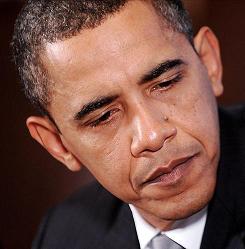American Academics Disappointed with Obama

Based on his first year in office, American academics are expressing disappointment in President Obama’s performance and believe he is headed toward a “mediocre” presidency.
That’s the term liberal historian Howard Zinn of Boston University uses in an article that solicited many viewpoints in the February 1st issue of The Nation magazine. Zinn adds that Obama’s foreign policy is “Hardly any different from a Republican…nationalist, expansionist, imperial and warlike.” And he adds that “mediocre” means “dangerous.”
Conservative Andrew Bacevich, professor of international relations at Boston University, writes, “Obama’s decision to escalate the war in Afghanistan indicates that he will not break with the existing national security consensus. The candidate who promised to ‘change the way Washington works’ has become Washington’s captive.”
Disappointment also characterizes the view of Glenn Loury, professor of the social sciences at Brown University. He says the high point of Obama’s administration was its inauguration “but it has been downhill since.” He complains “Obama has said little of substance about racial inequality” and “what he has said leaves much to be desired.”
On the subject American militarism, Loury says, “His conduct of the ‘war on terror’ and, most distressing, his escalation of our involvement in Afghanistan’s civil war is eerily reminiscent of the approach of his immediate predecessor. This is not change of any kind, let alone of the kind that we can believe in.”
Sociologist Katherine Newman, of Princeton, says, “The symbolic victory of our first African-American presidency gave way to disappointment over his centrism, which comes as no great surprise since Obama never advertised himself as a man of the left. And indeed, he isn’t.”
Marcia Angell, M.D., a Senior Lecturer at Harvard Medical School, writes, “count me among those who are disappointed in his (Obama’s) first year.” The reason: “He seems to lack the courage to push for the fundamental reforms necessary to deal with the enormous problems we face, and instead appeases the very forces that have gotten us into this mess.”
On health care, “the reform bill Obama is cobbling together wrongly retains the central role of the private insurance companies and requires millions of people to buy their products at whatever price they charge.”
Angell says her sharpest disappointment is when the administration backed the prohibition against buying lower-priced drugs from Canada and Europe. “During his campaign, Obama promised to end this absurd restriction, but now he’s siding with the pharmaceutical industry.”
In a related article in the magazine’s same issue, historian Eric Foner of Columbia University writes Obama has not learned to question the assurances of the Pentagon, “the lesson (President) Kennedy learned from the Bay of Pigs debacle at the outset of his presidency.”
Foner writes, “it is difficult to view Obama’s initial year without a feeling of deep disappointment.” On the domestic front, for example, Foner says it is “unlikely that an avowedly postracial president will directly address” the plight of blacks, whose economic condition continues to worsen.
Like President Jimmy Carter, “he does not have an industrial policy or a robust jobs-creation program and seems uninterested in addressing the hardships and structural imbalances caused by the decline of manufacturing,” Foner observed.
Adolph Reed, political scientist at the University of Pennsylvania, writes that as far back as the summer of 2007 Obama indicated that, if elected, he would “extend the war in Afghanistan into Pakistan.” Concludes Reed: “The only surprise about his presidency is how many ersatz leftists cling to the fiction that he’s anything other than a superficially articulate neoliberal Democrat in the Clinton mold and that his administration would act in any other way.”
How representative the above viewpoints may be of academic thinking generally is anybody’s guess but they fairly ooze disappointment. In sum, they describe Obama as plunging USA deeper into war while neglecting a home front that is falling apart. This week’s upset Republican victory for the late Senator Kennedy’s seat in liberal Massachusetts may be only a foretaste of the political disaster in store for Obama’s party. The biggest losers, of course, will be the people of the Middle East, whose suffering from American invasions and occupations continues without letup. #
Sherwood Ross is a Miami-based public relations consultant and columnist. He has reported for the Chicago Daily News and worked as a columnist for wire services. Reach him at [email protected]

